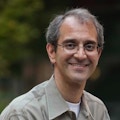
Professor Krishna Shenoy passed away in January 2023. You can read more about Krishna’s life and work here: A Scientist’s Quest for Better Brain-Computer Interfaces Opens a Window on Neural Dynamics.
Professor Krishna Shenoy directed the Neural Prosthetic Systems Lab (NPSL) at Stanford University, where his group conducted neuroscience and neuroengineering research to better understand how the brain controls movement and to design medical systems to assist those with movement disabilities. His neuroscience research investigated the neural basis of movement preparation and generation using a combination of electrophysiological, behavioral, computational and theoretical techniques. His neuroengineering research investigated the design of high-performance neural prosthetic systems, which were also known as brain-computer interfaces and brain-machine interfaces. These systems translated neural activity from the brain into control signals for prosthetic devices, which assisted disabled patients by restoring lost function. This work included statistical-signal processing, machine learning, low-power circuits and real-time system modeling and implementation.
Shenoy received his B.S. (summa cum laude) in electrical engineering from the University of California, Irvine under Professor G.L. Shaw in 1990, and both his master’s and Ph.D. in electrical engineering from the Massachusetts Institute of Technology under Professor C.G. Fonstad, Jr., in 1992 and 1995, respectively. He was the recipient of the Burroughs Wellcome Fund Career Award in the Biomedical Sciences (1999), an assistant professor at Stanford University (2001–2008), an Alfred P. Sloan Research Fellow (2002), a Defense Science Research Council (DARPA) Fellow (2003-2005), and co-director (along with Professor Jaimie Henderson) of the Neural Prosthetics Translational Laboratory, part of Stanford Institute for Neuro-Innovation and Translational Neuroscience (SINTN) and Stanford’s Bio-X / NeuroVentures program (2009–2023). He received the 2009 NIH Director’s Pioneer Award, was director and a principal investigator of DARPA-DSO’s REPAIR research program (2010), and received the 2010 Stanford University Postdoc Mentoring Award and the 2013 University of California at Irvine Distinguished Alumnus Award (Henry Samueli School of Engineering). Shenoy was a full professor at Stanford University (2012-2023), Departments of Electrical Engineering, Neurobiology (courtesy) and Bioengineering (affiliate).
Projects:
Computation-through-dynamics as a framework to link brain and behavior
Towards a theory of multi-neuronal dimensionality, dynamics and measurement